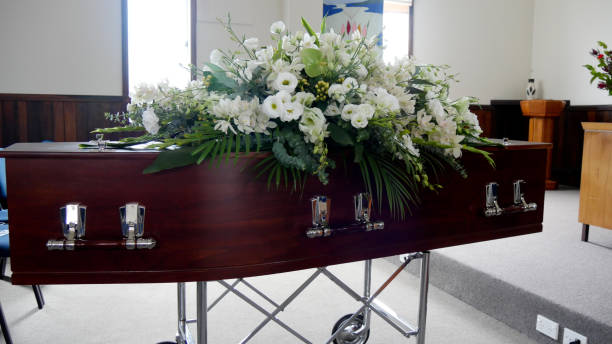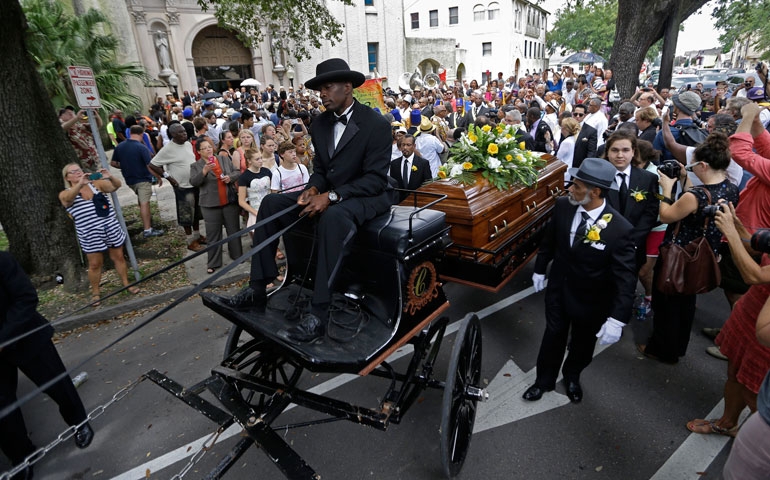Understanding Basic Funeral Costs in the US
When planning a funeral, it can be difficult to determine how much it costs for a funeral in the US. Funeral costs vary widely in the United States, depending on the type of service, the location, and the facilities used. Knowing the average cost of a funeral in the US can help you plan and budget for the event.
The type of funeral service is the most important factor in determining basic funeral costs. The most common type of service is a traditional funeral service, which includes a visitation, the funeral service itself, and the burial. This service typically costs between $7,000 and $10,000, depending on the location and the facilities used. Cremation services are generally much less expensive, costing between $1,500 and $3,000.
The location also plays a role in funeral costs. Funeral homes in larger cities tend to be more expensive than those in more rural areas. The cost of a funeral service can also be impacted by the facilities used. If the funeral service is held in a chapel or other large facility, then the cost is likely to be higher than if it is held in a church or other smaller facility.
Other factors can also affect the cost of a funeral. Embalming, for example, can add hundreds of dollars to the cost of a funeral service. The cost of a casket or urn can also vary widely, depending on the type and material used.
It’s important to understand how much it costs for a funeral in the US to ensure that you can properly plan and budget for the event.
Average Funeral Cost by State

The average cost by state in US can vary significantly depending on the location and specific arrangements. In the United States, the average cost of a funeral can range from around $7,000 to $12,000 or more. This cost typically includes services such as embalming, viewing, a ceremony, and burial or cremation. However, these costs can vary widely based on factors such as the location, funeral home, type of service, and additional options chosen by the family.
States with higher costs of living and metropolitan areas tend to have higher funeral expenses. For example, states like California, New York, and Hawaii often have higher average funeral costs due to their high cost of living and higher demand for funeral services. In these states, the average cost of a funeral can exceed $10,000, with some urban areas even surpassing $15,000. Conversely, states with lower costs of living and more rural areas may have lower average funeral expenses. States in the Midwest and South, such as Oklahoma, Mississippi, and Arkansas, typically have lower average funeral costs compared to their coastal counterparts.
It’s important to note that these are average figures and actual funeral costs can vary widely based on individual preferences, the level of service chosen, and additional expenses such as flowers, obituary notices, and catering. Additionally, cremation services tend to be less expensive than traditional burials, and prices can vary accordingly based on location and service options.
Funeral Cost Breakdown 2023
Funeral expenses can feel overwhelming for those grieving the loss of a loved one. In the United States, the average funeral cost is approximately $7,000. However, this number can vary widely, depending on your chosen services. A breakdown of funeral costs would help you better understand the expenses. For that reason, we’ve outlined the typical expenses associated with a funeral.
First, you should understand that a funeral home typically charges a “basic services fee.” This fee covers the costs associated with the funeral director’s services, such as filing paperwork, arranging the ceremony, and coordinating with the cemetery or crematory. This fee usually ranges from $1,000 to $2,000.
The next expense is the cost of the casket. This can range from a few hundred dollars for a simple cardboard casket to several thousand dollars for a more elaborate model.
Other items you may need to cover include a vault or grave liner, typically costing between $400 and $2,000. If you plan a viewing, you may need to rent viewing equipment, such as chairs or a podium. The equipment rental can range from $50 to $500.
If planning a service or memorial, you may need to purchase blank programs or order memorial cards. These costs can range from $30 to $200, depending on the number of copies you need.
Other than that, transportation and a cemetery plot cost you around $1200-$2400. The cost of a funeral can seem daunting, but a funeral cost breakdown 2023 would help you make better decisions beforehand.




What is the Average Funeral Cost in the United States?
Funerals are an important part of the grieving process, but the cost of a funeral can be overwhelming. The average funeral in the United States costs is approximately $7,640, according to the National Funeral Directors Association. This includes the casket cost, funeral service, and burial or cremation. The cost of a funeral can vary widely depending on the type of service, burial or cremation, and other factors.
When planning a funeral, it is important to consider all costs involved including the total cost of funeral and burial. Understanding the average funeral cost breakdown 2023 in the US would greatly help you make informed decisions. A casket or urn can range from a few hundred to several thousand dollars. The cost of the funeral service itself will depend on the type of service, the venue, and the number of attendants. If a burial is chosen, the cost of the grave plot, burial vault, and grave marker can add up quickly.
In addition to the total cost of funeral and burial services, there are other costs to consider. Death certificates, obituaries, transportation costs, and flowers are all additional expenses that can add to the total cost of the funeral. Additional costs, such as a memorial video or a reception, may also be required depending on the type of service.
Funerals are an important part of the grieving process, and the cost should not be the only factor when planning a funeral. However, understanding the average breakdown of funeral costs in the US and the various factors that can affect the total cost of a funeral can help families make informed decisions when planning a funeral.
Horse And Carriage Cost For Funerals
Horse and carriage funerals are a unique and beautiful way to honor a loved one’s passing. While the horse and carriage costs for funerals vary across the United States, they can be a meaningful and memorable way to pay tribute to a beloved family member or friend.
When considering a horse and carriage funeral, it is important to understand all the costs involved. The base horse and carriage cost for a funeral typically include a horse-drawn hearse and a driver. This cost can range from $250 to $1,000 or more, depending on the complexity of the funeral and the specific type of horse and carriage chosen.
In addition to the base cost, many funeral homes and horse and carriage companies will charge for additional services and equipment. This can include the cost of a harness or other accessories for the horse and the cost of the rental of a second horse for a family member to ride in the procession. Furthermore, some companies may charge for additional horses, carriages, and drivers for a large funeral procession.
It is also important to factor in the additional costs associated with the upkeep of the horse and carriage. This can include the cost of horse feed, equipment, and maintenance. Additionally, if a funeral home or horse and carriage company must travel to the location of the funeral, this can add to the cost.



Flowers for Funeral Cost
Flowers for Funeral Cost in US is your go-to source for funeral flower arrangements and sympathy floral gifts. We offer various funeral flower arrangements for all funerals, from traditional ceremonies to more contemporary services. Our selection includes casket sprays, standing sprays, wreaths, and other funeral flower arrangements. We also have a variety of sympathy floral gifts, including sympathy baskets, baskets of fruit, potted plants, sympathy cards, and more.
Our commitment to providing high-quality funeral flowers and sympathy floral gifts is unmatched in the industry. We use only the freshest, highest-quality flowers for all of our arrangements, so you can be sure your loved one’s memory will be honored with a beautiful floral arrangement. Our experienced and knowledgeable staff is here to assist you with any questions when ordering funeral flowers. We understand the importance of this special time and are here to help make the process as easy and stress-free as possible.
Our customer service representatives are available for assistance and advice on selecting the perfect funeral flower arrangement for your needs. We also offer delivery services throughout the US, so you can be sure that your funeral flower arrangements will arrive on time and in perfect condition.
No matter your budget or the occasion, Flowers for the average funeral in the United States costs the perfect funeral flower arrangement or sympathy floral gift to honor your loved one. Our commitment to quality, exceptional customer service, and competitive prices make it easy to find the perfect floral arrangement to show your love and respect for your loved one.
Tax on US Funeral Expenses
Funerals can be expensive, and the cost can be difficult to bear when dealing with losing a loved one. Tax on US funeral expenses is a complex issue and one that often adds to the overall burden of a funeral. In the United States, funeral expenses are not generally subject to federal or state income taxes. However, some taxes may apply to funeral purchases. Understanding the US’s average tax on funeral expenses would help you navigate your future decisions.
Generally, the sales tax rate for funeral-related goods and services is the same as the rate for other goods and services in the state. This includes burial plot purchases, caskets, headstones, and other funeral-related purchases. Depending on the state, there may be exemptions on certain items such as religious documents, memorial contributions, and burial plots. A higher sales tax rate may be applied to luxury items such as caskets or headstones in some areas.
In addition to sales taxes, some states may impose a use tax on funeral-related purchases. This tax applies to items purchased outside the state or online and is generally equivalent to the sales tax.
The taxation of funeral services and goods can vary widely from state to state. Before making any funeral-related purchases, it is important to understand the specific regulations and average tax on US funeral expenses in the US and your area. Additionally, some funeral homes may have policies and fees that must be considered when planning a funeral.




Tax Deductibility of Funeral Costs
Funeral costs can be stressful for many individuals and family members. Fortunately, you have the advantage of tax deductibility of basic funeral costs. The tax code allows individuals to deduct certain U.S. funeral expenses, including the cost of a burial plot, transportation for the body, cremation costs, and the total cost of funeral and burial services.
To be eligible for a tax deduction, the funeral expenses must be paid for by the decedent’s estate or the individual’s family or friends. Additionally, the U.S. funeral expenses must have been paid for within one year of the individual’s date of death.
The Internal Revenue Service (IRS) allows individuals to deduct the cost of a burial plot from their taxes. This includes any fees associated with the burial plot, such as grave markers or headstones. The cost of any transportation for the decedent’s body is also tax-deductible. This includes the cost of shipping the body from the place of death to the funeral home and transporting the body to the burial site.
The tax deductibility of funeral costs may serve your needs as this includes any fees associated with the cremation, such as the cost of the cremation container or the cost of the crematory services. The cost of the memorial service or funeral service is also tax-deductible. This includes the cost of the funeral director, celebrant, officiant, musicians, and any other services associated with the funeral service.
It is important to note that US funeral expenses are only tax-deductible if they are paid for by the estate of the decedent or the individual’s family or friends. Furthermore, the U.S. funeral expenses must be paid for within one year of the individual’s date of death.
Cost Of Live Streaming A Funeral
Funerals are necessary to honor and pay respects to the departed’s life. Although in-person attendance is the ideal way to mourn, restrictions due to the COVID-19 pandemic have made it difficult to distribute the time-honored traditions and private goodbyes to loved ones in person.
This is where Live Streaming a funeral ceremony can be a highly useful solution, often with minimal costs. Live streaming a funeral is a cost-effective method for shared gatherings that provides the much-needed comfort of virtual presence for participants unable to be present in person. It’s a touching tribute for all attendees, which can be shared over the internet and is an excellent way to bring the family and friends of the deceased together while maintaining safety measures due to the pandemic.
The cost of live streaming a funeral approach can depend on, but not be limited to, the length of the service, the number of participants, and most importantly, the type of technology used. Therefore, it’s important to understand the different types of live-streaming funeral technology available:
- Hosted streaming services, where a streaming company provides the technology and handles all aspects of the streaming process for a fee. This approach provides the most reliable and user-friendly way to stream a funeral live and can be a great option for those seeking an affordable service.
- Do-It-Yourself streaming through a computer or webcam. This method requires minimal effort and costs, mainly for additional audio and video equipment, and involves setting up the live stream yourself. It’s a great choice for those with a limited budget.
No matter the type of technology utilized, considering cost of live streaming funeral is an effective way to ensure those not in attendance can still participate in honoring the deceased’s life. And with the right cost savings, your service will be remembered.




Funeral Catering Cost
We understand that planning a funeral can be extremely expensive. That’s why, at Funeral Catering Cost, we offer tailored funeral catering services at a rate that works with any budget.
Our professional caterers will work with you every step of the way to create a menu that honors your loved one, perfectly matches the occasion, and is, above all else, affordable. Whether you need just a light snack for the viewing or an entire meal for 60 people, we’ll create something to give everyone peace of mind during these difficult times.
Funeral Catering Cost in the US understands how important it is to stick to spending limits while providing those attending with a meal that respects the deceased. Our experienced staff can accommodate customized menus that will be within your budget, whether large or small. Our practice is to offer the highest quality products while being cost conscious.
We strive to serve combinations of traditional and contemporary dishes featuring fresh local ingredients. We also accommodate food allergies, dietary restrictions, and religious considerations. We want to ensure that a meal that is suitable for everyone in attendance is available.
We offer various services, including plated meal options, buffet-style options, and cocktail buffets. We can also serve various drinks, such as beer, wine, soda, coffee, and tea. We will source all of the products and ingredients and provide all the necessary equipment and supplies. This will be included in the final price when you work with us.
At Funeral Catering Cost in the US, we are committed to taking the worry out of arranging the food for your loved one’s funeral. Contact us today to discuss all of our catering services and cost-effective packages so that you can make sure this part of the arrangements is stress-free.
Funeral Memorial Video Cost
Welcome to the Funeral Memorial Video Costs page! At this memorial service video production company, we understand how difficult the decision can be to choose a video production company for such an important event. We’re here to help make that decision easier.
Our experienced videographers work with individuals to create beautiful and memorable memorial and funeral videos. We understand that this is a difficult time, so we strive to provide compassionate service as we work alongside you to create a video that honors the life of your loved one.
At Funeral Memorial Video Costs, you can find several packages depending on your budget and needs. Our prices are competitive and detailed in the following packages: Basic Package: This includes one videographer and up to 3 hours of recording time. It also includes basic post-production work, such as editing and minor color correction.
This package costs $395. Standard Package includes two videographers and up to 4 hours of recording time. It also includes professional post-production work, including color correction, sound and image editing, and adding background music if desired. This package costs $495. Premium Package includes three videographers and up to 5 hours of recording time. It also includes a professional post-production package that includes color correction, sound and image editing, and the addition of background music, if desired.
This package also includes a DVD copy of the video for the family and its memorial service. This package costs $595. At Memorial Video Costs, we strive to provide our customers with the best quality of work to honor the memory of their loved ones.
We understand this is a difficult time, so we offer our condolences while providing an amazing service. Thank you for considering us in your time of need, and please get in touch with us if you have any questions.


Funeral Home Cost
Welcome to our funeral home insurance, your premier choice for your funeral needs. We understand that saying goodbye to a loved one is an emotional experience, and our goal is to ease the process with compassionate, economical funerals. We aim to provide meaningful and dignified funerals that respect your budget without compromising quality.
We have extensive experience creating custom funerals ranging from simple memorial services to more elaborate ceremonies, including wakes, funeral processions, and graveside services. Our staff is highly trained in creating individualized services to meet your needs.
We ensure all funeral details are taken care of so that stress is minimized and you can focus on grief and healing. We are commited to provide affordable funeral home cost while providing quality services at reasonable prices. Our knowledgeable staff can help you navigate important decisions and provide a range of pricing plans to meet every budget. We want to ensure that all our customers receive the dignified funeral they deserve without breaking the bank.
We expand our services to help ease the stress of death, from complete funeral planning to grief counseling and memorial services. We are here to go above and beyond to meet your needs. Our knowledgeable staff can provide additional floral, catering, and photography services.
Our comprehensive funeral packages address all the details necessary for a meaningful and respectful funeral. We work closely with each family to ensure the funeral is personalized and unique. We also offer convenient payment options to ensure you can pay for the funeral services without worrying about your finances.
We invite you to contact us with any questions you may have. Our phone lines are available 24 hours a day, and our staff is always available to help. We are here to ensure your funeral is as stress-free and dignified as possible. Let us show you why funeral home cost is the premier choice for quality and economical funerals.


Jazz-Inspired Funerals
Welcome to Jazz-Inspired Funerals, a tribute to life and music. We know it can be difficult to say goodbye to someone you love, both in life and in death, and we have crafted a unique service that celebrates life and honors the memory of your loved one in a creative and personal way.
Considering funeral cost with jazz, every funeral should be personal, respected, and memorable. We specialize in crafting unique jazz-inspired funeral services that provide a beautiful outlet to express love, respect, and contemplation for those who have passed.
Jazz provides a distinct and memorable way to celebrate life and reflect on death with its mix of minor and major chords, beautiful solos, and improvisation. It’s an ideal melodic accompaniment to the sadness and heavy emotions of grief and mourning.
Our services include using a live jazz band, accompanied by a vocalist, to provide personal music at your loved one’s funeral or celebration of life ceremony. There are many wonderful songs and artists, and we guarantee a professional and respectful performance.
We understand that each person’s life is unique, so allow us the opportunity to craft a personalized musical tribute. So when the time enters to say goodbye, make it special and memorable.
Trust funeral cost with jazz to wrap the appreciation and reflection of your loved one’s life with beautiful music—allowing for a unique and irreplaceable experience. Contact us today to learn more about our services.
Police Escort Cost for Funerals
When making funeral arrangements, there is one worry you don’t have to face: an expensive police escort. Creative Funerals offers a variety of funeral packages and services to accommodate your needs, including police escorts for funerals.
Our professional and experienced team goes the extra mile to ensure your loved one’s funeral is the perfect tribute. When you choose Creative Funerals, you can rest assured that you are getting the best possible service and industry standards without any hidden costs.
Our cost of police escort for funeral is competitively priced and included in the package. You know exactly what you’re paying for and can budget accordingly. With a police escort, your loved one’s funeral procession will have an added sense of respect and dignity. This helps honor your departed and ensure they will be given the dignity they deserve.
Our police escort provides a secure, safe, and stress-free professional experience. Your loved one will be treated with the utmost respect and kindness throughout their professional journey. Our police escorts are specially trained to provide a dignified and peaceful experience with minimal disruption.
The presence of a police officer also adds an extra layer of safety for those attending the funeral. At Creative Funerals, we understand that arranging a funeral is an emotional time, and we strive to make the process as easy and stress-free as possible.
With our police escort cost for funerals included in the package, you can rest assured that your loved one will have the most respectful and dignified funeral processional possible. Contact us today to discuss our cost of police escort for funerals and to tailor a package that suits your needs and budget.
Get Hybrid Life Insurance today with M-Life Insurance.


READY TO START SAVING MONEY?
Learn in seconds which types of insurance match you.
